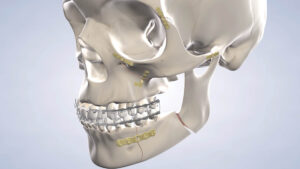Facial Trauma
Oral and Maxillofacial Trauma Experts Here When You Need Us
 Facial trauma can happen to anyone and cause a lifelong impact on oral health, oral function, and self-esteem. Our team understands the urgent nature of facial trauma incidents and responds quickly to ensure optimal results. We specialize in healing bone and soft tissue injuries while achieving aesthetically pleasing results. Dr. Salin, Dr. Weiner, Dr. Semanoff, Dr. Nack, and Dr. Kosakowski are board-certified oral surgeons who will provide emergency oral surgery services to you and your loved ones in the event of facial trauma. Oral and maxillofacial surgeons are also on staff at local hospitals and respond to facial trauma emergencies.
Facial trauma can happen to anyone and cause a lifelong impact on oral health, oral function, and self-esteem. Our team understands the urgent nature of facial trauma incidents and responds quickly to ensure optimal results. We specialize in healing bone and soft tissue injuries while achieving aesthetically pleasing results. Dr. Salin, Dr. Weiner, Dr. Semanoff, Dr. Nack, and Dr. Kosakowski are board-certified oral surgeons who will provide emergency oral surgery services to you and your loved ones in the event of facial trauma. Oral and maxillofacial surgeons are also on staff at local hospitals and respond to facial trauma emergencies.
If you are experiencing a life-threatening medical emergency, go to the nearest emergency room and receive care from the oral surgeon on call.
If you are experiencing a non-life-threatening incident, contact our office and we will see you as soon as possible. We have offices in Feasterville, Newtown, and Abington, PA, and proudly respond to urgent facial trauma cases for patients of all ages.
Types of Facial Trauma
Oral surgery is often necessary to treat facial fractures or other injuries that affect the oral and maxillofacial regions. There are different types of facial injuries that can occur, and the treatment will vary depending on the type and severity of the injury. As oral surgeons, we are qualified to administer anesthesia and sedation and will select the right option based on the severity of your injury and your level of discomfort or anxiety.
Soft Tissue Injuries
Soft tissue injuries include lacerations inside the mouth or on the face. This also includes damage to facial nerves, salivary glands, or salivary ducts. To treat soft tissue injuries, we will use stitches or dissolvable sutures to close the wound and inspect the underlying facial structures for damage, such as fractures to facial bones, and treat them accordingly. Serious wounds may require soft tissue grafts.
Broken or Fractured Facial Bones
Just like an arm or leg, the cheeks, nose, eye sockets, and jaws can fracture or break. A cast is used to treat a broken limb, but we cannot put a cast around the face. Instead, we will use small plates and screws to stabilize the bone. This is known as rigid fixation and is an alternative to wiring the jaws together. We make every effort to conceal incisions, reduce visible scarring, and minimally affect your facial appearance.
Avulsed (Knocked-Out) Tooth
Injuries to the teeth may require collaborative care from an oral surgeon, restorative dentist, or endodontist. If a tooth gets knocked out, you should see a dental professional as soon as you can, ideally within 30 minutes. The sooner we can see you in our office, the higher the chances are for successful reattachment. We will try to reattach the tooth, but if reattachment is not possible, we can discuss your options for replacing the tooth, such as a dental implant.
What To Do With a Knocked-Out Tooth
If one or more of your teeth gets knocked out, do not panic. Pick up the tooth by the crown, do not touch the roots, and place it in a container of saliva or whole milk. Do not wipe anything off of the tooth, even if it is dirty. If you do not have whole milk, you can gently keep the tooth in your mouth between your cheek and gums. Contact our office, and we will see you as soon as possible.
Board-Certified Experts in Facial Trauma Care
The oral surgeons at Innovative Oral Surgery & Dental Implants are board-certified by the American Board of Oral and Maxillofacial Surgery. By achieving and maintaining this certification, our surgeons hold themselves to the highest standards of clinical excellence and patient care.
Our surgeons are on staff in local emergency rooms and hospitals where they have managed a variety of oral and maxillofacial trauma. As part of our commitment to care, we stay at the forefront of technology in our field and use advanced 3D imaging technology to detect and diagnose facial injuries, create precise treatment plans, and achieve predictable results. We understand the stressful nature of facial injuries, and you can count on our surgeons and staff to provide comfort and support throughout the treatment process.
Types of Anesthesia
We offer a variety of choices to ensure a comfortable oral surgery experience.
Facial Trauma in Feasterville, Newtown, and Abington, PA
If you have experienced a facial injury and require care from an oral and maxillofacial surgeon, we encourage you to contact Innovative Oral Surgery & Dental Implants. Our surgeons are experienced in managing facial trauma cases and our team is here to support you and your loved ones during a traumatic incident. We have offices in Feasterville, Newtown, and Abington, PA, and look forward to being a part of your recovery journey.
Hear From Our Patients
A Practice Built On Trust, Innovation, and Clinical Excellence
For over 50 years, we have had the privilege of serving our communities with the highest level of oral surgery care. We love what we do, and we look forward to providing you and your loved ones with an outstanding patient experience and incredible results.
